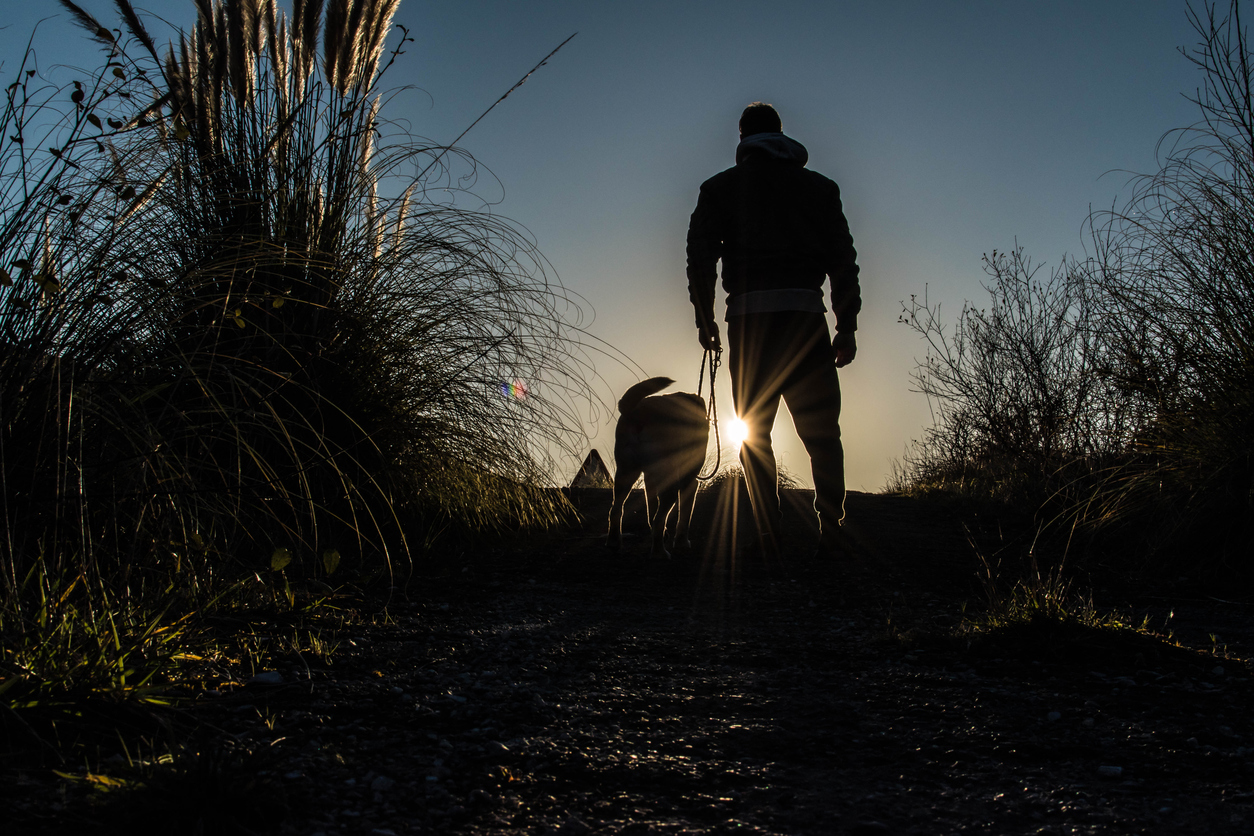Happy Breath will pay your shipping with orders of $100 or more (mainland US orders only).
Tails from the trail and tips on training your human

Tips for Hiking Safely in the Dark – Night Hiking

Hiking and trekking are quickly gaining popularity among the youth as a way to directly link to nature. There is something so magical about hiking at night. If you love adventures and are drawn to the night, this can be the ideal experience. While stargazing while you walk amongst the scenic outdoors is very appealing and soothing, but it can also be dangerous if you are unprepared.
Here are some tips on how to prepare for a night hike:
1. Tell someone where you’re going
Inform a trusted family member or friend about your plans. Tell them which trail you will be hiking on and how they can contact you. Also, tell them when they can expect you to be back. Be sure to call them when you arrive home safely.
2. Don’t go alone
Nighttime can be scary and dangerous. You can hike alone in the day to spend some quiet time but do take someone with you at night. Having company will keep you calm and let you enjoy the experience without worrying about looming shadows or snapping twigs. There is safety in numbers!
3. Hike when there is a full moon
Before you plan your night hike, search the internet for which phase the moon will be in that night. It is better to hike under a full moon or something close so that you have the soft glow of the moon to guide you on your hike. Make sure that the sky is clear so the moonlight can reach you easily. It is highly important that you pick the right day for your hike.
4. Hike on a familiar trail and don’t rush
Leave the discovering new trails for daytime hikes. Hike on a familiar trail at night so that you are aware of any dangers beforehand. Hike slowly and steadily. Your hike should not be too long. Keep it short and easy. This will allow you to enjoy the pleasure of hiking safely at night with a reduced risk of injury or harm.
5. Start your hike when it’s light out
Leave your house before sunset and reach your trail before night falls. If you hike by the soft light of the dusk, you will get familiar with the trail and will be able to enjoy the night hike on your way back. Even if you are familiar with the trail, it will refresh your memory and allow you to make mental notes of the terrain.
6. Pack plenty of lights
While this may seem like an obvious tip, people often don’t pack extra batteries and their lights are not appropriate for a hike. Remember that you don’t just want to see where you’re going. You also wish to enjoy the night hike and the amusements it has to offer. Your lights should not be too bright as this will ruin your night vision and you probably won’t be able to see the stars. Make sure that the light is soft and yellow or red in color so that your night vision isn’t impacted.
7. Keep an emergency cellphone
Trails might not have good cellphone reception. Keep an extra cellphone with you when you hike at night in case of emergencies. Remember to charge this phone before you leave your house. In case your battery dies, this emergency phone will allow you to contact someone for help.
8. Pack appropriately for the night
Bug sprays are essential to keep you protected from bites. Keep matches and lighters in case you need to light a fire for any reason; for example, if you get lost, suddenly feel cold, or want to heat up a meal. Keep a portable charger and extra batteries. Pack emergency food and water in a small pack separate from your primary backpack. Make sure that your backpacks are organized and you remember where each thing is because it can be difficult to see in the dark.
9. Research
Before you leave for your hike, research the type of wildlife you might encounter on your trail. You may also ask a guide if one is available so that you can pack appropriate medical equipment and a first-aid kit. If you are unsure of what to pack, consult a local doctor on first aid essentials.
10. Keep warm clothes
If you are hiking in winters, keep extra warm clothes in case it gets colder than you anticipated. Check the weather forecast to know how cold and humid it will be. It can get chilly at night even in summers. Make sure you don’t catch a cold. If it is likely to rain, keep waterproof clothing like hats, coats, and shoes to keep dry.
11. Be vigilant
You can’t be too careful when hiking at night. Keep your mind clear and sharp, but do not scare yourself. Enjoy the hike while being cautious and observant of your surroundings. Don’t play music or wear earphones when hiking at night because this can distract you and prevent you from picking up auditory cues on potential dangers.
12. Stay on the trail
It can be tempting to wander off the trail, especially if you spot something interesting or see a pretty path winding away from your main trail. Do not wander too far from your trail because it can be difficult to find your way back in the dark and you may get lost. This is especially true for forests or hiking trails with limited vision.
Night hiking is a completely different experience than daytime hikes. They are accompanied by unique challenges that require a different skill set. Do your homework and be adequately prepared for your adventure. Good luck and have fun!